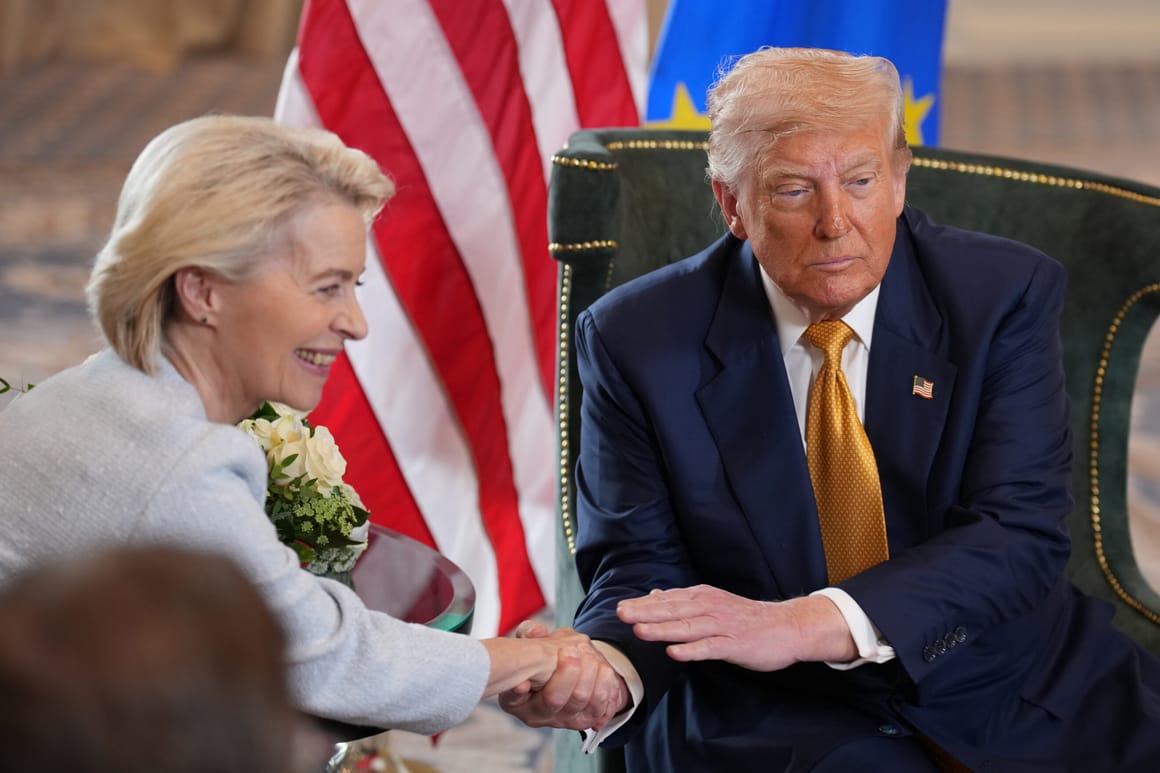Business
Brussels Confronts Beijing to Secure Trade Deal with Trump

BRUSSELS — In a decisive move to strengthen transatlantic trade relations, European Commission President Ursula von der Leyen engaged in tough negotiations with China, leading to a significant trade agreement with U.S. President Donald Trump. The agreement was finalized during a meeting at the U.S. president’s Turnberry golf resort in Scotland on July 30, 2023, where both leaders reached a handshake deal aimed at addressing competitive challenges posed by China.
During her visit to Beijing earlier in the week, von der Leyen met Chinese President Xi Jinping and Premier Li Qiang to mark the 50th anniversary of EU-China diplomatic relations. Despite the celebratory occasion, von der Leyen described the current state of relations as having reached an “inflection point.” She emphasized the need for a more balanced trade dynamic, stating that the EU could not maintain open markets to Chinese exports unless Beijing took meaningful steps to improve the trading relationship.
In her strategy to secure U.S. collaboration, von der Leyen has adopted a more assertive stance toward China in recent months. This shift comes in response to both the competitive pressures from Beijing and the potential threats from the Trump administration, which had previously hinted at raising tariffs on EU goods to as much as 30 percent beginning August 1, 2023. The newly struck deal resulted in Trump lowering his tariff threat to 15 percent and allowing for certain sectoral exemptions.
Strengthening Transatlantic Alliances
The agreement also includes the establishment of an alliance focused on industrial metals, such as steel and aluminum, to mitigate the effects of China’s overproduction on global markets. Maroš Šefčovič, the EU’s trade chief, highlighted that this alliance would create a protective economic framework through tariff rate quotas. Although the details of this arrangement require further negotiation, it represents a collaborative effort to tackle issues of non-market overcapacity.
The backdrop of von der Leyen’s negotiations with Trump contrasts sharply with her experience at the EU-China summit. Prior to the meeting, the European Union had imposed new sanctions on two Chinese banks linked to Russia, prompting Beijing to express its “strong dissatisfaction” with the EU’s actions. Despite the tensions, the summit resulted in an agreement to expedite licensing for raw materials, addressing longstanding complaints from European companies regarding China’s export controls over rare earth minerals.
EU officials have criticized China’s negotiation tactics, referring to them as the “stinking fish strategy,” where Beijing creates new points of contention that must be resolved through negotiation.
Concerns Over Future Relations
Initially, there was optimism for improved EU-China relations following Trump’s return to the White House, with von der Leyen advocating for constructive engagement. In a February address to EU ambassadors, she expressed the need for the bloc to explore opportunities for enhanced trade and investment ties. However, China’s subsequent imposition of strict export controls has complicated these efforts.
At a recent G7 summit, von der Leyen accused China of “weaponizing” its dominance in critical raw materials. Her remarks highlighted a growing frustration with China’s industrial overproduction and its support for Russia in the ongoing Ukraine conflict.
While von der Leyen’s tougher approach may have aided in securing a deal with Trump, concerns remain about the sustainability of this strategy. Francesca Ghiretti, director of the China Europe Initiative at the RAND Corporation, cautioned that the current U.S. administration appears more inclined to pursue a bilateral agreement with China rather than collaborating with allies. Ghiretti stressed the importance of the EU maintaining its own approach to China, independent of its relationship with the U.S.
As the EU navigates its complex relationship with China, the implications of the recent trade deal with the United States will likely shape its future economic landscape. The focus now shifts to how effectively both the EU and the U.S. can work together to confront challenges arising from China’s global economic influence.
-

 Top Stories3 months ago
Top Stories3 months agoTributes Surge for 9-Year-Old Leon Briody After Cancer Battle
-

 Entertainment4 months ago
Entertainment4 months agoAimee Osbourne Joins Family for Emotional Tribute to Ozzy
-

 Politics4 months ago
Politics4 months agoDanny Healy-Rae Considers Complaint After Altercation with Garda
-

 Top Stories4 months ago
Top Stories4 months agoIreland Enjoys Summer Heat as Hurricane Erin Approaches Atlantic
-

 World5 months ago
World5 months agoHawaii Commemorates 80 Years Since Hiroshima Bombing with Ceremony
-

 Top Stories3 months ago
Top Stories3 months agoNewcastle West Woman Patricia Foley Found Safe After Urgent Search
-

 Top Stories5 months ago
Top Stories5 months agoFianna Fáil TDs Urgently Consider Maire Geoghegan-Quinn for Presidency
-

 World5 months ago
World5 months agoCouple Convicted of Murdering Two-Year-Old Grandson in Wales
-

 World5 months ago
World5 months agoGaza Aid Distribution Tragedy: 20 Killed Amid Ongoing Violence
-

 World5 months ago
World5 months agoAristocrat Constance Marten and Partner Convicted of Infant Murder
-

 Top Stories4 months ago
Top Stories4 months agoClimbing Errigal: A Must-Do Summer Adventure in Donegal
-

 Top Stories4 months ago
Top Stories4 months agoHike Donegal’s Errigal Mountain NOW for Unforgettable Summer Views









